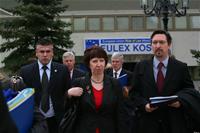EU mission in Kosovo takes on organ trafficking affair
Evelyna Topalova, January 31, 2011
 Only days after the Parliamentary Assembly of the Council of Europe (PACE) called for an international investigation of the allegations of human organs trafficking in Kosovo, the EU Rule of Law Mission (EULEX) announced it has opened a preliminary investigation into Dick Marty's report.
Only days after the Parliamentary Assembly of the Council of Europe (PACE) called for an international investigation of the allegations of human organs trafficking in Kosovo, the EU Rule of Law Mission (EULEX) announced it has opened a preliminary investigation into Dick Marty's report.
The EULEX said they were taking the allegations of the Swiss senator very seriously and reassured they were capable to conduct the investigation. The statement comes as politicians in Belgrade and Marty himself voiced doubts about the mission's capacity to lead the probe, due to the strong pressure from Kosovo society.
The mission also said its prosecutors were prepared to get immediately to work as soon as they received proofs and facts related to the report. The European mission also called on Marty to present the evidence he had in regard to allegations that Kosovo Liberation Army leaders were involved in human organs trafficking and other illegal activities after the end of the 1998-1999 Kosovo conflict.
The Council of Europe Rapporteur voiced readiness to cooperate with EULEX by providing facts and revealing names of witnesses, provided that their security was guaranteed. Witnesses' protection was among the main points in Pace's resolution.
In his report Dick Marty stated that it was hard to lead the investigation as potential witnesses were intimidated by KLA fighters who were using blackmail, death threats and violence to make them silent.
"We understand concerns about witness protection but we have full confidence in our own witness protection unit. Experience has already shown that it is capable of handling high level and sensitive cases," EULEX reassured. The mission, however, stated that prosecution could not take place without evidence.
The EU mission in Kosovo has already proved it has the willingness and the capacities to investigate serious accusations. Among prominent figures targeted by EULEX's anti-corruption probe were Central Bank Governor Hashim Redxepi and Telecommunications Minister Fatmir Limaj.
In December EULEX prosecutors pressed charges against seven people on suspicion of human organs trafficking in the so-called Medicus case. The suspects include a number of doctors and a senior official of the Health Ministry.
The investigation was opened in 2008 after revelations that illegal organ transplant operations were performed in the private clinic Medicus outside Pristina. The case was disclosed after a Turk collapsed at the airport after having a kidney removed for a transplantation to an Israeli citizen. After the revelations, the clinic was shut down.
Turkish police detained in January the Turkish doctor, Yusuf Sonmez, on suspicion of having carried out illegal transplant operations in the Kosovo clinic. According to the charges against him, the victims were promised 15 000 euros for their organs which were sold to rich recipients in Germany, Canada, Poland and Israel for up to 100 000 euros.
Since its deployment in Kosovo two years ago, the EU mission has proved to be very effective in the rule of law area. Its employees are not only helping local authorities in the police and customs areas but are also handling very sensitive cases which were out of reach for the justice so far.
 Bakir Izetbegovic, Andrej Plenkovic | © Council of the EU
Bakir Izetbegovic, Andrej Plenkovic | © Council of the EU Aleksandar Vucic, Recep Tayyip Erdogan | © Serbian Presidency
Aleksandar Vucic, Recep Tayyip Erdogan | © Serbian Presidency Jean-Claude Juncker, Zoran Zaev | © European Commission
Jean-Claude Juncker, Zoran Zaev | © European Commission